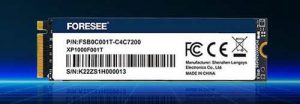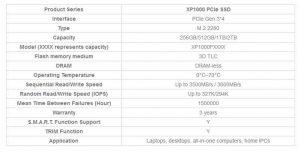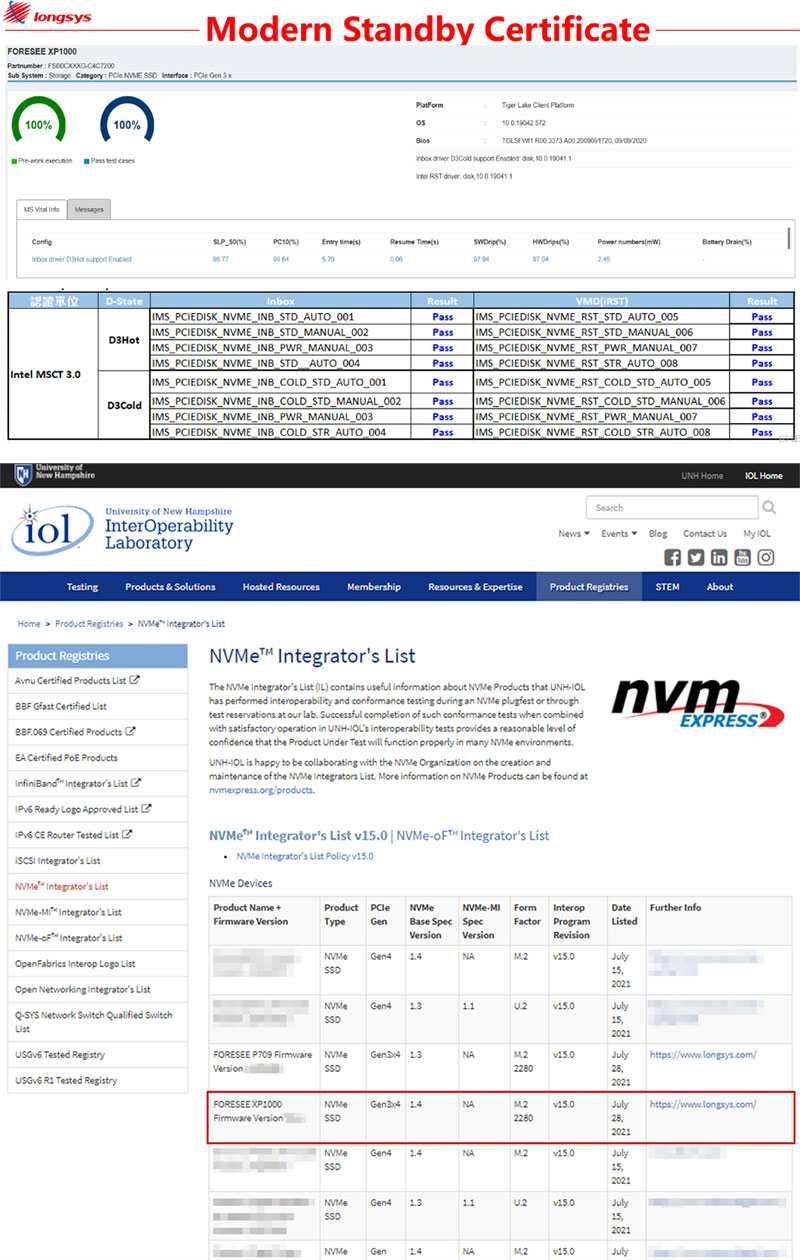Foresee/Longsys Unveils XP1000 PCIe NVMe 1.4 M.2 Up to 2TB SSD
Up to 3,500MB/s and 3,000MB/s in sequential R/W speeds, and 327,000/294,000 IO/s in random R/W
This is a Press Release edited by StorageNewsletter.com on August 12, 2021 at 1:32 pmDriven by accelerated global digital transformation, the storage demand seen in various segments has continued to soar in 2021, granting a boost to the SSD market.
As a key part of PC and server components, SSD has always been a focal point for major PC OEMs when it comes to performance, stability, and compatibility. Figuring out how to purchase SSD products that can accurately match the market has become a challenge, as resources are in short supply. To resolve this issue, the Foresee SSD R&D team from Shenzhen Longsys Electronics Co., Ltd. has come up with XP1000 PCIe SSD.
With a capacity of up to 2TB,it is one of the higher capacity products in the current firm’s SSD product line. Compared with the previous gen of mainstream products, the performance of XP1000 PCIe SSD has been improved by nearly 50%, up to 3,500MB/s and 3,000MB/s in sequential R/W, and 327K/294K IO/s in random R/W.
The product supports L1.2 low power consumption. In actual tests, the product achieved L1.2 at less than 3.3mW, which can be effective in prolonging the battery life of the terminal device.
Customized master controls:
-
Uses multiple features to ensure data stability and security
The XP1000 PCIe SSD employs customized main controls and an enhanced local DRAM-less architecture with HMB technology support. The product conforms to the mainstream NVMe 1.4 protocol. Empowered by a built-in intelligent power management unit, it achieves low power consumption in both active and idle modes. In addition, the company’s customized master controls incorporate multiple protection mechanisms, Smart Cache, power-on reset integrated within chip, multi-level power management, NAND boot partition and other functions, which ensure the stability and security of storage products.
Compatibility certified by multiple platforms:
-
Complies with mainstream hardware standards
In recent years, the Intel Evo platform has been making upgrades to laptop components, technologies, functions, and appearance to improve the mobile user experience of laptops. The ‘1-second wake’ function, meaning the laptop can awaken from the sleep state in less than 1s, optimizes the user experience. However, this function must be certified by Intel Modern Standby, which poses a huge challenge in regards to the performance and power consumption of SSD products. To meet the high hardware requirements of mainstream platforms, the XP1000 PCIe SSD completed certification in July 2021, and will soon be applied to the Evo platform.
In addition, XP1000 PCIe SSD was also UNH-IOL-certified.
The University of New Hampshire InterOperability Laboratory (UNH-IOL) is a public laboratory providing testing services in multiple fields. UNH-IOL defines NVMe Test Suites, including:
-
NVMe Conformance Test Suite
-
NVMe Interoperability Test Suite
This further proves the XP1000 PCIe SSD’s performance and low power management.
EMI and ESD qualified:
-
Addresses procurement pain points of PC OEMs
With the advancements in electronic technologies and the popularization of electronic products, electromagnetic environments are more complex than ever. Electromagnetic interference has become a key issue that must be tackled by engineers and manufacturers. Qualified EMI and ESD are mandatory items of the national standards for electronic information products. They have always been a problematic issue in the development of SSD products, and are a rigid demand for PC OEMs. On the one hand, it is necessary to prevent the EMI generated during SSD operation from affecting other hardware products or modules. On the other hand, it is also necessary to prevent ESD from affecting how SSDs are used. To this end, the XP1000 PCIe SSD has undergone testing by the company’s SSD R&D and test teams. EMI and ESD indicators are above the national standard and have passed the product test, meaning that it also meets company’s quality requirements for SSD products.
Outlook
The recent debut of Intel 12th Gen Core processors enabled by PCIe 4.0 has unveiled the era of PCIe 4.0 storage, an era featuring higher performance and lower latency. To keep up with the pace of the industry, the firm’s SSD product line plans to launch the PCIe Gen4*4 mainstream XP2100 SSD (DRAM-less) and the PCIe Gen4*4 flagship XP3000 SSD (DRAM-Base) in the second half of this year. The read performance of these 2 series can reach up to 5,000MB/s and 7,000MB/s, respectively. Users will be seeing them on major PC applications soon.

















 Subscribe to our free daily newsletter
Subscribe to our free daily newsletter

